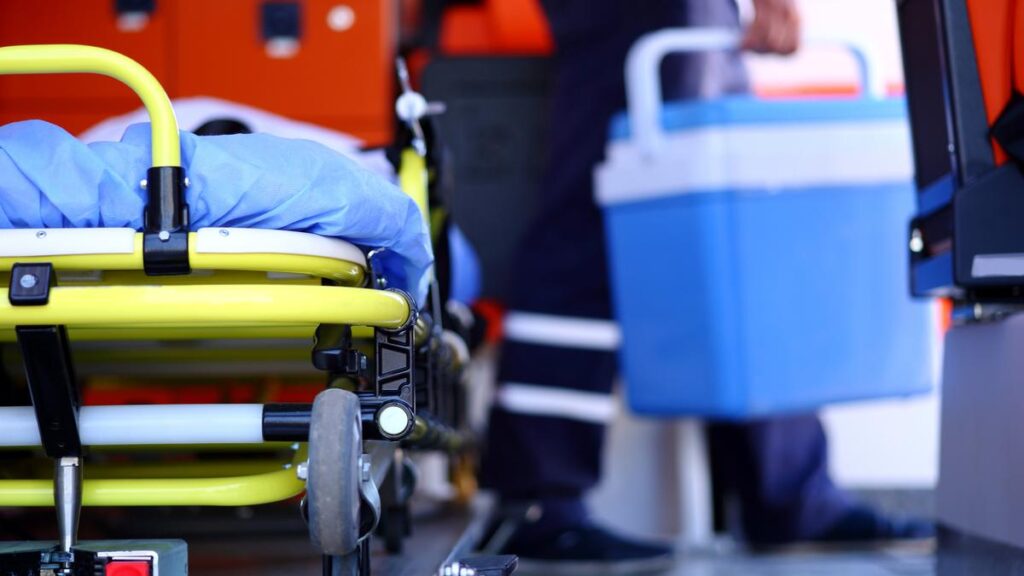
Human Organ Transplantation on ambulance.
| Photo Credit: Getty Images/iStockphoto
A report released by the Union Ministry of Health and Family Welfare has revealed that the organ transplantation programme in the country has been crippled by multiple issues, especially insufficient funding, shortage of specialised doctors, and procedural delays.
The report dated June 19, 2025, which followed a high-level meeting of senior health officials to review the status of organ transplantation activities in government hospitals and identify the key challenges, pointed to infrastructural deficiencies, especially shortage of Intensive Care Unit (ICU) beds and lack of financial support to patients who required lifelong medication that was expensive.

Explaining the bottlenecks and other issues faced by State-owned institutions, the report said only 13,476 kidney transplants were performed, both in government and private hospitals, against the recommended 1 lakh cases last year. The capacity of government hospitals was not adequate to meet the target of organ transplants and creation of new centres were “definitely” required.

Infrastructural issues
The report elaborated on the lack of facilities in government healthcare institutions, saying a significant number of government hospitals had reported the absence of dedicated infrastructure for organ retrieval and transplantation, including specialised transplant operation theatres (OTs) and dedicated Transplant Intensive Care Units (TICUs). Existing OTs and ICUs were frequently overburdened with general patient loads.
A critical and frequently cited issue was the shortage of ICU beds, which were essential for maintaining potential brain-stem dead (BSD) donors and for post-operative care of recipients. In many trauma centres, beds were unavailable for potential donors due to high patient volume.
Many institutions, including several All India Institutes of Medical Sciences (AIIMS), lacked in-house Human Leukocyte Antigen (HLA) cross-matching laboratory facilities. The dependency on external laboratories was causing significant delays and logistical challenges in the transplantation process. Several government hospitals had stated that their current facilities required substantial logistical and infrastructural upgrades to meet the standards necessary for performing complex transplant procedures.
The report compiled by the National Organ and Tissue Transplant Organisation, which convened the meeting, said the shortage of specialised faculty coupled with frequent transfer of trained personnel, was disrupting the continuity and establishment of transplant programmes. A major bottleneck was the scarcity of dedicated and trained transplant surgeons, nephrologists, urologists, anaesthetists, neurosurgeons/neurologists and intensivists within the government hospitals.
Experts representing various government institutions in different States flagged issues relating to delays in obtaining formal approval and constitution of the BSD Committees, which was essential to initiate deceased organ donation programme. The handling of medico-legal cases, particularly involving trauma patients who represented the largest pool of potential donors, was often cumbersome and lacked a streamlined process, thereby discouraging organ donation.
Burden on patients
On the paucity of funds, the report said some hospitals had reported inadequate funds to initiate or restart specialised transplant programs, such as lung transplantation, which necessitated expensive equipment and preservatives. A significant concern was the high cost of immunosuppressant drugs, which patients must take for life. The financial support available under current schemes was often limited to the first year, imposing a substantial burden on patients thereafter.
It was highlighted that there were no formal incentives for transplant and organ donation teams (surgeons, nurses, coordinators etc) on a case-by-case basis. Such incentives could motivate them to increase the number of transplants. The non-inclusion of liver and heart transplantation and the associated lifelong follow-up costs in major Central health schemes like Ayushman Bharat were identified as significant barriers for underprivileged patients
The report “strongly recommended that liver and heart transplantation, including the lifelong cost of immunosuppressants for post-transplant recipients, be comprehensively included under the central Ayushman Bharat Pradhan Mantri Jan Arogya Yojana [AB-PMJAY] scheme”.
Published – June 22, 2025 09:24 pm IST

